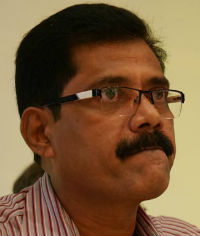Wil je onze #cleanekleren campagne mee een stevige boost geven? Via jouw organisatie en jouw persoonlijk netwerk? We hebben heel veel handtekeningen nodig om Belgische sportkledingbedrijven te overtuigen om in de toekomst meer ethisch verantwoorde kleding te produceren.
In april won Wereldsolidariteit de Fair Time Award van Medialaan. Met het prijzengeld konden WS en ACV een indringende tv-spot maken en uitzenden. Een unieke kans om consumenten warm te maken om de #cleanekleren campagne te steunen. Afgelopen weekend ging hij de ether in.
Garment workers in Cambodia work 10 hour shifts, 6 days out of 7, for a very low wage. During a working day a garment worker burns the same amount of calories as a professional runner in 4 hours. "You like to suffer in your sportswear but nobody likes to suffer for your sportswear." Sign the #cleanekleren petition by Wereldsolidariteit and ACV on www.cleanekleren.be!
Made in Cambodja
Reclamebureau Boondoggle werkte het concept voor deze tv-spot uit. In 30 seconden wordt de kern van het verhaal rond #cleanekleren getoond: de fysieke inspanningen van kledingarbeidsters zijn vergelijkbaar met die van topatleten. De clip is gemaakt in Cambodja en de metingen werden uitgevoerd bij een echte kledingarbeidster.
Afzien voor jouw sportkleren
Made in Cambodja dus, net zoals jouw sportkleren. In Cambodja werkt een kledingarbeidster meer dan 10 uur per dag, 6 dagen op 7, voor een hongerloon. Tijdens een werkdag verbrandt ze evenveel calorieën als een sporter die 4 uur hardloopt. Jij ziet graag af in sportkleren, maar niemand ziet graag af voor jouw sportkleren.
Teken de petitie hier.
Also read the recent report from The Guardian here.
“Act as if what you do makes a difference. It does.”
In april won Wereldsolidariteit de Fair Time Award van Medialaan. Met het prijzengeld konden WS en ACV een indringende tv-spot maken en uitzenden. Een unieke kans om consumenten warm te maken om de #cleanekleren campagne te steunen. Afgelopen weekend ging hij de ether in.
Garment workers in Cambodia work 10 hour shifts, 6 days out of 7, for a very low wage. During a working day a garment worker burns the same amount of calories as a professional runner in 4 hours. "You like to suffer in your sportswear but nobody likes to suffer for your sportswear." Sign the #cleanekleren petition by Wereldsolidariteit and ACV on www.cleanekleren.be!
Made in Cambodja
Reclamebureau Boondoggle werkte het concept voor deze tv-spot uit. In 30 seconden wordt de kern van het verhaal rond #cleanekleren getoond: de fysieke inspanningen van kledingarbeidsters zijn vergelijkbaar met die van topatleten. De clip is gemaakt in Cambodja en de metingen werden uitgevoerd bij een echte kledingarbeidster.
Afzien voor jouw sportkleren
Made in Cambodja dus, net zoals jouw sportkleren. In Cambodja werkt een kledingarbeidster meer dan 10 uur per dag, 6 dagen op 7, voor een hongerloon. Tijdens een werkdag verbrandt ze evenveel calorieën als een sporter die 4 uur hardloopt. Jij ziet graag af in sportkleren, maar niemand ziet graag af voor jouw sportkleren.
Teken de petitie hier.
Also read the recent report from The Guardian here.
“Act as if what you do makes a difference. It does.”









